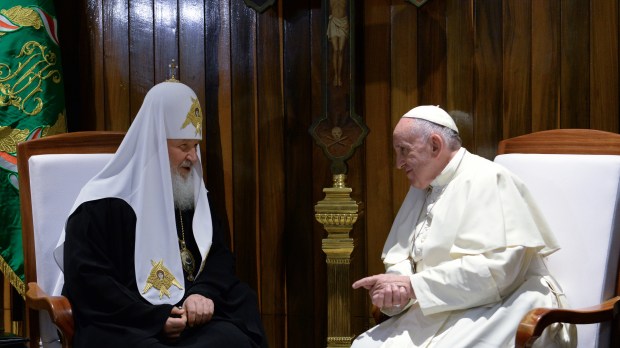The meeting between Francis and Kirill opens up a new, significant chapter in the building of unity between the Catholic Church and the Orthodox Church; this will be the ecumenism of witness. While the theological dialog, which helps clarify the doctrinal differences is important, the shared witness of both churches is of far greater significance. The actions of the divided disciples of Jesus will no longer be persuasive. Faced with the same global challenges, both lungs of Christianity, the Western and the Eastern ones, should breathe in unison.
The meeting in Cuba was to break the ice of uncertainty and preconceptions, as both sides had realised that the time is now to react jointly to what is going on in the world. In the face of the threats to peace, wars in the Middle East, Africa and Ukraine, which Francis calls “the third world war being fought in pieces,” both shepherds have come to realise that separate statements of the churches is not enough. In Syria, Iraq and other countries of the Middle East or North Africa, Christians have in huge numbers been leaving the territories they have occupied since the apostolic time. There is an urgent need for international solidarity: cooperation, humanitarian aid for unprecedented numbers of refugees and the assurance of their return to their country of origin. Both leaders call for solving conflicts via negotiations and preventing terrorism. Furthermore, they stress the necessity of inter-faith dialogue, respect for those who profess other religions and condemn crimes committed “in the name of God.”
The declaration of the pope and the patriarch indicates the dire need for both churches to take a joint stand with respect to the most pressing global concerns. The declaration enumerates many such problems: aggressive secularisation, restriction of the rights of people who believe in God, blatant social injustice, crisis of the family and disrespect for human life through abortion, euthanasia or genetic manipulations. Both leaders recognise the need for a joint witness of the churches in today’s Europe so the culture of the continent retains the values that have always formed its foundations, laid on the bedrock of the Judeo-Christian heritage.
The problem in the relations between the Catholic Church and the Russian Orthodoxy stems from the fact that the latter has always been subject to secular authority and has acted “in synch” with it, both spiritually and politically. The great machinery of Russian diplomacy, including the Patriarch himself, tends to speak with one voice outside and do something else at home. Since the Patriarch has condemned crimes “committed in the name of God,” pressure should be exerted on him to finally stop justifying the aggression in Ukraine through the religious theory of “Russki Mir” and to unequivocally censure the crimes. The Orthodox Church continues to provide ideological fuel to Russian neo-imperialism. The litmus paper of Patriarch Kirill’s credibility should be his invitation of Francis to Russia, without the fear that his own authority will pale in comparison with that of St. Peter’s Successor.
Referring to the declaration, one should also bear in mind the context of the forthcoming first ever Holy and Great Council of the Orthodox Church, scheduled to take place in June. The meeting of Kirill and Francis was to strengthen the position of the patriarchate of Moscow among the other Orthodox churches. At present, the Patriarch of Moscow does everything in his power to shift from the position of the “third Rome” to that of the “second Rome” and to curb the competences of the ecumenical Patriarch of Constantinople and of the future Council. The situation is tense, as witnessed by the confrontation of Bartholomew I and Kirill during a meeting in preparation for the Council, held in late January this year in Pregny-Chambésy in Geneva. During the meeting, replete in mutual resentments, the patriarch of Moscow tried to move the meetings of the Council to Moscow and to forestall the establishment of the autocephalous Orthodox Church in Ukraine, which would make it independent of the patriarchate of Moscow. His agenda proved successful and he will no doubt take advantage of the meeting with the pope to further strengthen his position.
Marcin Przeciszewski is editor-in-chief and president of the Catholic Information news agency (KAI) in Warsaw.

